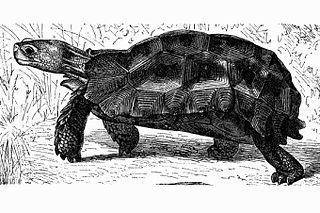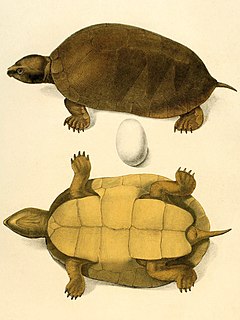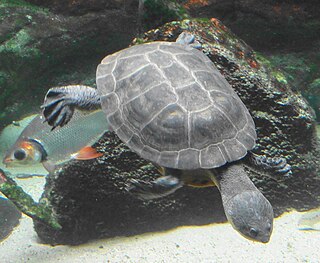
The Aldabra giant tortoise is a species of tortoise endemic to the islands of the Aldabra Atoll in the Seychelles. It is one of the largest tortoises in the world. Historically, giant tortoises were found on many of the western Indian Ocean islands, as well as Madagascar, and the fossil record indicates giant tortoises once occurred on every continent and many islands with the exception of Australia and Antarctica. Many of the Indian Ocean species were thought to be driven to extinction by over-exploitation by European sailors, and they were all seemingly extinct by 1840 with the exception of the Aldabran giant tortoise on the island atoll of Aldabra. Although some remnant individuals of A. g. hololissa and A. g. arnoldi may remain in captivity, in recent times, these have all been reduced as subspecies of A. gigantea.

Trinidad and Tobago are continental islands with a geologically very recent history of direct land bridge connection to South America. As a result, unlike most of the Caribbean Islands, Trinidad and Tobago supports a primarily South American flora and fauna and has greater diversity of plant and animal species than the Antilles. However, rates of endemism are lower than in the rest of the Caribbean because there has been less time for genetic isolation from mainland populations because of the history of land bridge connections and hence fewer opportunities for speciation, and so a greater proportion of the species in Trinidad and Tobago are also found on the South American mainland. Trinidad is nearer to mainland South America and has been directly connected to the mainland via land bridges more often and for longer periods than Tobago. This, as well as Trinidad's larger size and more varied topography and hydrology compared to that of Tobago allow greater species and ecosystem diversity on the former compared to that on the later of the islands.

The Arrau turtle, also known as the South American river turtle, giant South American turtle, giant Amazon River turtle, Arrau sideneck turtle, Amazon River turtle or simply the Arrau, is the largest of the side-neck turtles (Pleurodira) and the largest freshwater turtle in Latin America. The species primarily feeds on plant material and typically nests in large groups on beaches. Due to hunting of adults, collecting of their eggs, pollution, habitat loss, and dams, the Arrau turtle is seriously threatened.

Podocnemis is a genus of aquatic turtles, commonly known as South American river turtles, in the family Podocnemididae. The genus consists of six extant species occurring in tropical South America. Three additional species are known only from fossils.

The yellow-spotted Amazon river turtle, also known commonly as the yellow-headed sideneck turtle and the yellow-spotted river turtle, is one of the largest South American river turtles. It can grow up to 45 cm long and weigh up to 8 kg. This species can be recognized by its black or brown oval carapace with distinctive low keels on the second and third scutes. Yellow spots on the side of its head give this species its common name. These spots are most prominent in juveniles and fade with age. Females can be up to twice the size of males.

The Indian black turtle or Indian pond terrapin is a species of medium-sized freshwater turtle found in South Asia.

The Amboina box turtle or Southeast Asian box turtle is a species of Asian box turtle.

Aldabrachelys is the recognised genus for the Seychelles and Madagascan radiations of giant tortoises, including the Aldabra giant tortoise.

The forest hinge-back tortoise, also known commonly as the serrated hinge-back tortoise or Schweigger's tortoise, is a species of tortoise in the family Testudinidae. The species is indigenous to the tropical forests and marshes of central and western Africa.

Kinixys is a genus of turtles in the family Testudinidae. The genus was erected by Thomas Bell in 1827. The species in the genus Kinixys are native to mainland Africa and commonly known as hinged tortoises.

The big-headed Amazon River turtle, also known as the big-headed sideneck, is a species of turtle in the family Podocnemididae. The species is monotypic within the genus Peltocephalus.
Pelusios broadleyi, commonly known as the Turkana mud turtle, Broadley's mud turtle, or the Lake Turkana hinged terrapin, is a species of turtle in the family Pelomedusidae. The species is native to eastern Africa.

Sometimes called the bearded toadheads but better known by their scientific name of Phrynops this genus of turtles has often been a bit of a dumping ground for the short-necked South American turtles of the family Chelidae.

Vanderhaege's toad-headed turtle is a species of turtle in the family Chelidae. The species is endemic to South America.

August Friedrich Schweigger was a German naturalist born in Erlangen. He was the younger brother of scientist Johann Salomo Christoph Schweigger (1779-1857).

Mesoclemmys is a South American genus of turtle in the Chelidae family.

The Iberian pond turtle, also known as the Mediterranean pond turtle or Mediterranean turtle, is a species of turtle in the family Geoemydidae. The species is endemic to southwestern Europe and northwestern Africa.

Phrynops geoffroanus, commonly known as Geoffroy's side-necked turtle or Geoffroy's toadhead turtle, is a species of large side-necked turtle in the family Chelidae. The species is endemic to South America.

Adanson's mud turtle is a species of turtle in the family Pelomedusidae. The species is endemic to north-central Africa.
Mesoclemmys nasuta is a species of turtle that lives in Bolivia, Colombia, Peru, Brazil and the Guyanas.



















